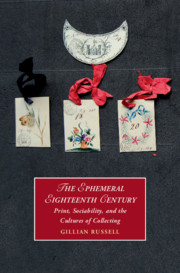Book contents
- The Ephemeral Eighteenth Century
- Cambridge Studies in Romanticism
- The Ephemeral Eighteenth Century
- Copyright page
- Dedication
- Contents
- Figures
- Acknowledgements
- Introduction
- Chapter 1 Accidental Readings and Diurnal Historiographies
- Chapter 2 Making Collections
- Chapter 3 The Natural History of Sociability
- Chapter 4 Sarah Sophia Banks’s ‘Magic Encyclopedia’
- Chapter 5 ‘Announcing Each Day the Performances’
- Chapter 6 Transacting Hospitality
- Chapter 7 England in 1814
- Conclusion
- Bibliography
- Index
- Cambridge Studies in Romanticism
Chapter 7 - England in 1814
Frost Fairs, Peace, and Persuasion
Published online by Cambridge University Press: 13 August 2020
- The Ephemeral Eighteenth Century
- Cambridge Studies in Romanticism
- The Ephemeral Eighteenth Century
- Copyright page
- Dedication
- Contents
- Figures
- Acknowledgements
- Introduction
- Chapter 1 Accidental Readings and Diurnal Historiographies
- Chapter 2 Making Collections
- Chapter 3 The Natural History of Sociability
- Chapter 4 Sarah Sophia Banks’s ‘Magic Encyclopedia’
- Chapter 5 ‘Announcing Each Day the Performances’
- Chapter 6 Transacting Hospitality
- Chapter 7 England in 1814
- Conclusion
- Bibliography
- Index
- Cambridge Studies in Romanticism
Summary
Chapter 7 focuses on the year 1814 to argue for the importance to Romantic-period culture of an ephemeral historicism. The year 1814 was notable for ephemeral public events, beginning with the February frost fair on the Thames and the extensive celebrations for the premature peace in the summer, culminating in the Jubilee Fair in the royal parks of London. Both occasions produced a wide range of ephemeral print – tickets, handbills, and prints – collected and arranged from very different political perspectives by Sarah Sophia Banks and the radical reformer Francis Place. I focus on 1814 in order to trace how ideas of ephemerality as developed in the eighteenth century mutated into the category of the everyday in the nineteenth. The year 1814 is also significant in literary history as the year in which Jane Austen set her posthumously published Persuasion. I relate that novel to the significance of 1814 as a particularly ‘ephemeral’ year, with reference to Austen’s acknowledgement of the presence of ‘flying’ literature in the form of the newsmen of Bath.
Keywords
- Type
- Chapter
- Information
- The Ephemeral Eighteenth CenturyPrint, Sociability, and the Cultures of Collecting, pp. 214 - 250Publisher: Cambridge University PressPrint publication year: 2020



